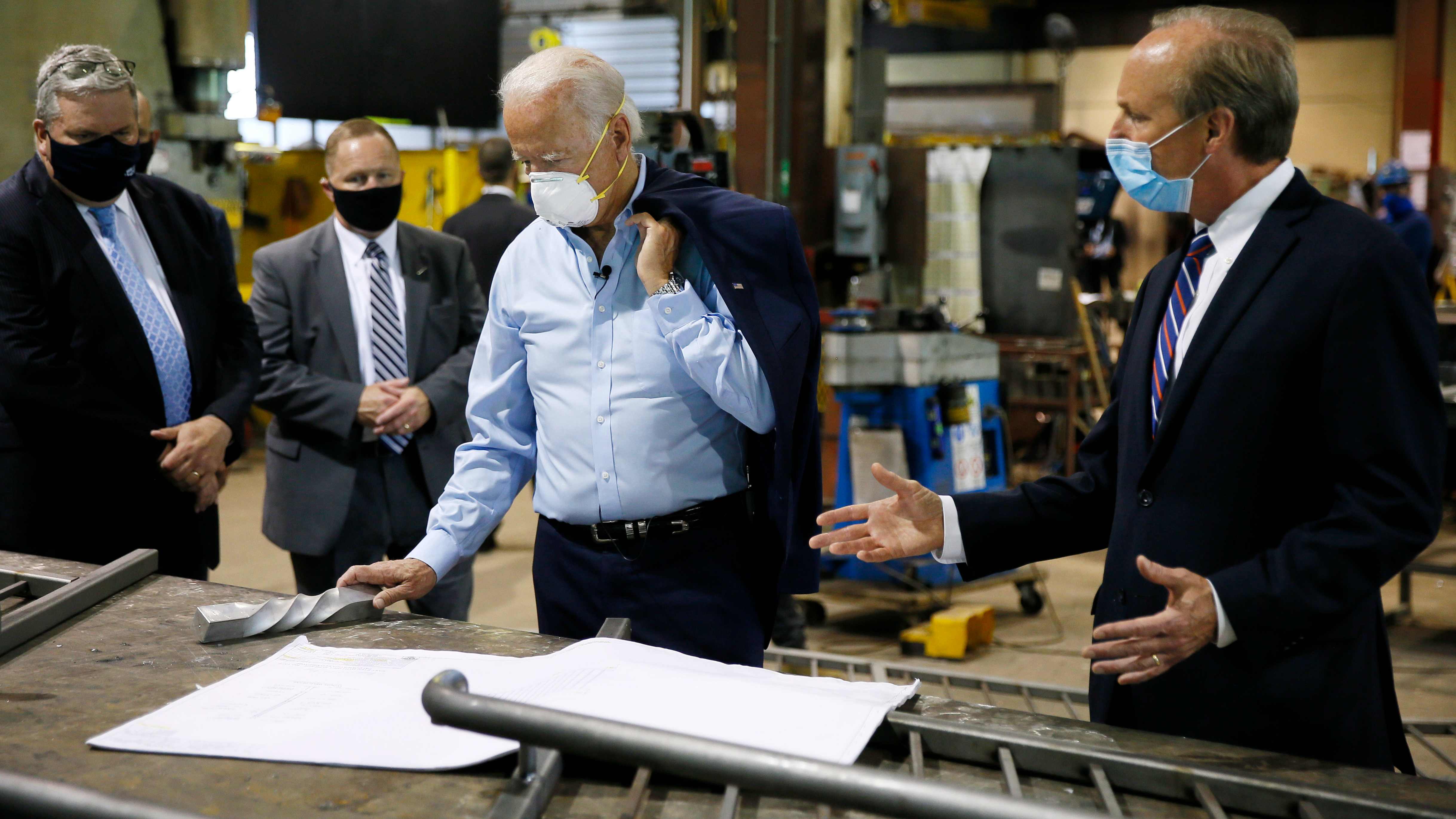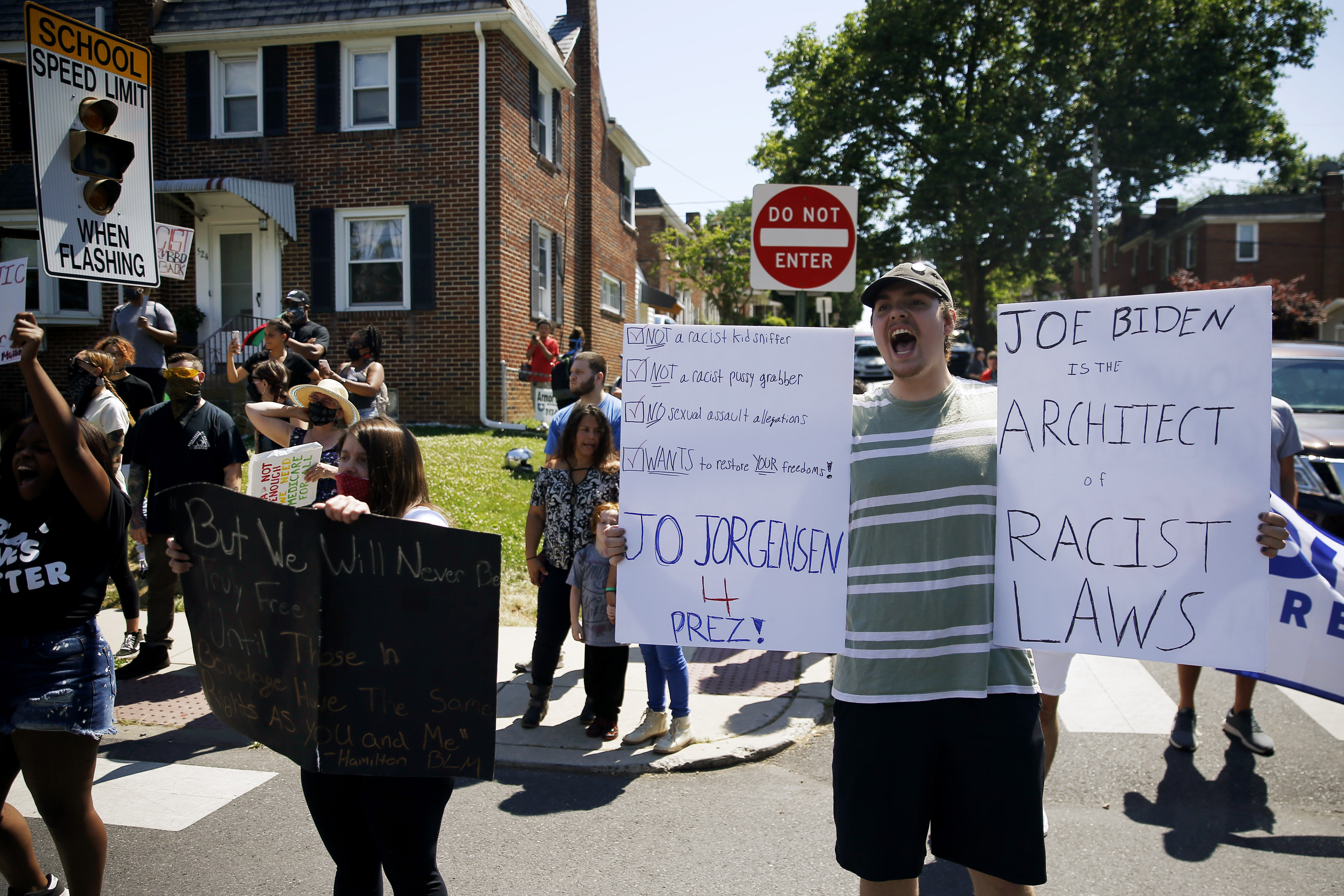
Democratic presidential candidate, former Vice President Joe Biden (C), listens to McGregor Industries owner Bob McGregor (R), when giving a tour of the metal fabricating facility, in Dunmore, Pennsylvania, July 9, 2020. /AP
Democratic presidential candidate, former Vice President Joe Biden (C), listens to McGregor Industries owner Bob McGregor (R), when giving a tour of the metal fabricating facility, in Dunmore, Pennsylvania, July 9, 2020. /AP
Editor's note: Freddie Reidy is a freelance writer based in London. He studied history and history of art at the University of Kent, Canterbury, specializing in Russian history and international politics. The article reflects the author's opinions, and not necessarily the views of CGTN.
From the outset of the 2016 presidential campaign, the Democratic Party were at a disadvantage because they couldn't understand the appeal Donald Trump had for millions of voters, and arguably they still don't. After the hubris of the Clinton campaign it is remarkable that in 2020, we appear to be at the same juncture. Is it being possible that the Democrats believe once again that they will stroll into the White House?
A recent Gallup poll found that while President Trump's ratings were low but stable at 38 percent; support among Republicans had actually increased in recent months to 91 percent from 89 percent in May. While not ideal, 38 percent is not insurmountable though. The president saw a similarly low rating in 2017 and actually enjoyed a high of 49 percent as recently as May.
The poll also revealed that divide between parties was as stark as it ever has been before. What is puzzling though, is that Joe Biden is much more of a unifying candidate than Hillary Clinton was and yet this divide remains. Biden is yet to take a meaningful step into the center ground.
The poll found that Trump's popularity has dipped due to his erratic handling of the coronavirus and plummeting employment levels. The aftermath of the death of George Floyd has also had a detrimental impact, particularly with younger voters. However, the wholesale adoption of the Black Lives Matter narrative by mainstream media outlets and celebrities has simultaneously galvanized support for Donald Trump among conservative voters.
The Democratic Party appears unwilling to win over Republican voters and chooses to continue seeing fans of the president as "a basket of deplorables." In fact, the response to the death of George Floyd has done much to alienate and infuriate even those with the slightest conservative leanings.

Protesters demonstrate outside an event for Democratic presidential candidate, former Vice President Joe Biden, June 25, 2020, in Lancaster, Pennsylvania. /AP
Protesters demonstrate outside an event for Democratic presidential candidate, former Vice President Joe Biden, June 25, 2020, in Lancaster, Pennsylvania. /AP
Contrary to assertions of vocal Democratic politicians such as Alexandria Ocasio-Cortez, Trump's support does not solely come from those wearing "Make America Great Again" caps or attending rallies. Part of the reason Trump won the 2016 election is that he was a maverick, who was prepared to speak for a "silenced majority." The Black Lives Matter movement is a proponent of ideological extremism, the dismantling of capitalism and of the disbelief of the nuclear family. These two examples alone represent a direct threat to deeply held conservative values and diminish the prospect of broadening Democratic appeal.
The party has been stuck in a cycle of "anything but Trump" and as Biden's chances increase there is growing complacency. This complacency is seriously misguided though. Despite the dip in popularity due to the handling of the coronavirus, it is entirely plausible that Trump will win a second term. This campaign has yet to full get underway.
Due to the virus, the campaign has been a much lower profile affair than previous elections, but as the intensity builds ahead of November, the potential for the damaging gaffes which have dogged previous Biden campaigns, increases. There are also persistent questions related to Biden's age and fitness for office. An attack line which the president will ruthlessly pursue.
The campaign is sure to test both candidates; at this juncture it would be foolish for either to consider themselves a favorite. Another recent poll conducted by The Hill, found that Biden's lead had shrunk by six points in July to 43, with 39 points to the incumbent, thereby further demonstrating the fragility of Biden's position.
The same poll also found that 52 percent of voters between the age of 18 and 34 intended to vote for Biden, a vital demographic for the former vice president. A reliance on this voting segment can pose issues come polling day though as younger demographics tend to turn out in lower numbers. This demographic also interacts more on social media where there is an overwhelming liberal, Democratic voice leading to greater voter complacency and potentially, apathy. This was a trend recently witnessed in the 2019 UK general election where the Conservative Party won a landslide victory.
The challenge for Biden's campaign team though, is the need to articulate a coherent vision for America and not become content with acting as a refuge for the disenfranchised and disaffected. Biden must be bold and offer a compelling message of hope and change. Donald Trump will portray himself as a protector of American values in the face of "cancel culture," a protector of America's place in the world against China and a protector of American workers with his opposition to "unfair" trade deals. "Making America great again" will carry a new resonance as the U.S. seeks to recover from COVID-19 and Joe Biden needs to be ready to counter that sentiment with his own vision.
(If you want to contribute and have specific expertise, please contact us at opinions@cgtn.com.)